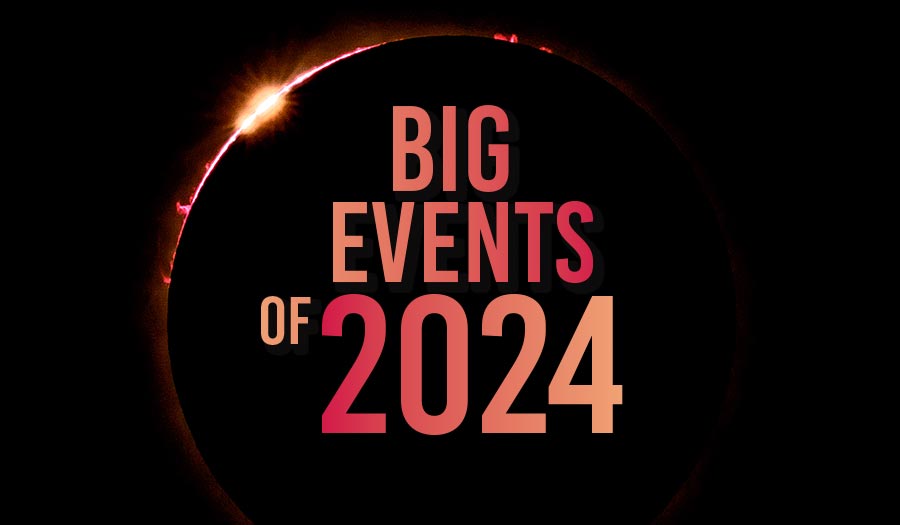 JOSH EDELSON/AFP VIA GETTY IMAGES
JOSH EDELSON/AFP VIA GETTY IMAGES
Article
As we step into a new year, reflecting on the past 12 months through the lens of God’s Word offers hope for what lies ahead.
Learn the why behind the headlines.
Subscribe to the Real Truth for FREE news and analysis.
Subscribe NowThe eclipse on April 8, 2024, was unforgettable. Early in the day, a hazy sky threatened to obscure the first total eclipse in Ohio in over 200 years—the last one dating back to 1806. Only 21 total solar eclipses have crossed the lower 48 states in U.S. history, and I did not want to miss seeing this moment.
As the full eclipse approached, the skies cleared. Co-workers from across The Restored Church of God’s World Headquarters campus gathered outside wearing eclipse glasses, one hoping to capture the moment in stunning detail with a high-powered camera lens.
The totality was breathtaking. The sun disappeared, an eerie darkness fell, and the stillness was surreal. As the famous diamond ring effect sparkled, one of my colleagues explained the phenomenon of Baily’s beads.
Standing there, I felt small—humbled by the work of an awesome God who created such wonders. The eclipse felt supernatural, a brief pause from the ordinary.
Looking back, it serves as a fitting metaphor for 2024 itself—mostly darkness, with rare moments of light.
The year saw its share of shadow: high-profile assassination attempts in the United States, over 60 political killings in Mexico, and intensifying wars in the Middle East, Europe and Africa. Natural disasters—hurricanes close to home and devastating floods abroad—added to the turmoil.
Meanwhile, millions fled violence and oppression, straining resources in nations already struggling with post-pandemic inflation and economic disruptions.
These dark events reminded us of our purpose at The Real Truth. Throughout 2024, we aimed to help readers focus on God and His Plan during uncertain times. Our work has been to provide a steady reminder of the Being who remains in control, carrying out a purpose far greater than we can fully comprehend.
Global Tensions
In 2024, nearly half of the world’s population—over 70 countries—participated in national elections. Expectations for a volatile year were met, and at times, reality exceeded imagination.
In the United States, presidential campaign season began as anticipated: hyperpartisan divides, relentless mudslinging and an onslaught of political ads. Then things turned shocking.
During the campaign, Republican candidate Donald Trump’s path to victory was nearly derailed by two assassination attempts. The first occurred at a campaign rally in Butler, Pennsylvania, where Mr. Trump sustained minor injuries from one of eight bullets fired, while a spectator was tragically killed. The act sobered citizens on both sides of the aisle. Two months later, another attempt followed in Florida, with the would-be assassin leaving a summary of his motives in a letter: “This was an assassination attempt on Donald Trump but I failed you. I tried my best and gave it all the gumption I could muster.”
After U.S. President Joe Biden’s first and only debate against Mr. Trump, Mr. Biden shocked the nation by dropping out of the race. Vice President Kamala Harris was thrust into the spotlight as the Democratic nominee without having gone through a primary. She campaigned for the nation’s highest office but fell short in November. Analysts blamed her late entry and lingering doubts about her qualifications. Mr. Trump won the presidency.
The year’s political turmoil and raw bitterness underscored why The Real Truth examines politics through a biblical lens. Articles such as The 2024 Presidential Election: A Bible-based Survival Guide and What God Thinks of Politics helped readers prepare for what was to come.
Globally, elections brought similar instability. Despite widespread participation in the democratic process, the results often seemed inconsequential in the bigger picture. Daniel 2:21 reminds us that it is God who “removes kings, and sets up kings.” In the New Testament, Romans 13:1 says, “For there is no power but of God: the powers that be are ordained of God.”
Leadership transitions—no matter how turbulent—ultimately rest in God’s hands.
Across Europe, political and economic crises boiled over. The governments of France and Germany collapsed, leaving the European Union scrambling.
Meanwhile, conflicts raged without pause. The Israel-Hamas war and the Russia-Ukraine war continued through the year, straining global resources. Unprecedented direct conflict between Israel and Iran stunned news watchers. Our article America & Israel: What Can Break Their Bond? looked at the relationship between the U.S. and Israel amid the raging conflicts. We also examined the ancient roots of today’s global players in our article Biblical Identities of Modern Nations.
Elsewhere, Russia’s deepening alliance with North Korea—covered in our article Russia and North Korea’s Partnership—provided Moscow with much-needed support, including North Korean troops for its military campaign in Ukraine.
Longstanding tensions continued to simmer in Asia. China and Taiwan remained at odds, while North Korea’s provocations escalated. South Korea faced its own turmoil in December when President Yoon Suk Yeol declared martial law, citing threats from North Korea and internal “anti-state forces.” Public outrage was swift, leading the National Assembly to impeach the president. Prime Minister Han Duck-soo stepped in as acting president.
The war in Sudan, which began in April 2023, continued into 2024. Fighting between the Sudanese Armed Forces and the paramilitary Rapid Support Forces led to 60,000 deaths in just one region within the first 14 months of the fighting, as reported by Al Jazeera. Many observers consider Sudan a failed state.
Violence, death and disease continued to run rampant in Haiti, with gangs terrorizing the citizens of the Caribbean nation. Just in March, over 50,000 fled Haiti’s capital. By fall, nearly half the country’s population of more than 11 million people were experiencing crisis levels of hunger or worse. We looked at Haiti’s struggles in our article Haiti’s Gang War.
One of 2024’s most stunning developments came late in the year, when Syria’s government under President Bashar Assad fell. Following a rapid offensive by opposition forces, Mr. Assad fled to Russia, ending over 50 years of Assad family rule.
Amid these events, discussions of World War III felt more real than ever. June marked the 80th anniversary of D-Day, the pivotal moment in WWII when Allied Forces stormed the beaches of Normandy in France. Commemorations reminded us of the sacrifices of the past while highlighting today’s fragile peace. In D-Day: 80 Years Later, Editor-in-Chief David C. Pack explained how the world will ultimately find peace—it will not come from the efforts of men.
These developments painted a sobering picture: a world grappling with instability, war and political upheaval, desperately searching for security.
More Challenges
The year was the hottest on record where average global temperatures surpassed the 1.5 degrees Celsius threshold set by the Paris Climate Agreement. Differing views on the causes of global temperature changes aside, this year’s catastrophic weather events impacted millions.
A heat wave in Yemen—where temperatures can hit 122 degrees—was followed by intense flooding in the same region. Both natural events worsened an already precarious humanitarian crisis for those living in refugee camps and other areas of the nation.
In the United States, two devastating hurricanes—Helene and Milton—left trails of destruction. Hurricane Helene made landfall in the southern U.S. on September 26 as a Category 4 storm, triggering catastrophic flooding and claiming over 150 lives, primarily in North and South Carolina. According to BBC News, it was the deadliest hurricane to hit the U.S. mainland since 2005’s Katrina.
Just weeks later, in early October, Hurricane Milton also struck Florida. Rapidly intensifying into a Category 5 cyclone, Milton, according to sources, was the strongest tropical storm worldwide for the year. These storms contributed to an exceptionally destructive Atlantic hurricane season, which caused more than $500 billion in damages.
In late October, Spain faced its deadliest natural disaster in decades. Torrential rains unleashed catastrophic flash floods, killing more than 220 people, according to Reuters. Record rainfall overwhelmed infrastructure, swept away vehicles, and devastated homes. Damages soared into the billions of euros, reigniting debates about climate change and preparedness in Europe.
The year also saw other shocking disasters. On March 26, the Francis Scott Key Bridge in Baltimore collapsed after a container ship struck a support pier. Despite a timely warning call that halted traffic, six maintenance workers were killed. Shipping at the Port of Baltimore, a critical economic hub, ground to a halt for 11 weeks, costing an estimated $15 million per day in state revenue, Governing magazine reported. Full reconstruction is projected for fall 2028 at a cost nearing $2 billion.
Amid this devastation, the United States saw a glimmer of hope in its long battle against the fentanyl crisis.
The Drug Enforcement Administration reported: “According to the CDC, the U.S. saw a 14.5% decrease in overdose deaths from June 2023 through June 2024. Also, for first time since 2021, DEA has seen a decrease in the potency of fentanyl pills. The latest DEA laboratory testing indicates 5 out of 10 pills tested in 2024 contain a potentially deadly dose of fentanyl. This is down from 7 out of ten pills in 2023 and 6 out of ten pills in 2022.”
Yet experts warn the crisis is far from over. We analyzed America’s more than 50-year battle with drugs in our article Fentanyl: Can the War on Drugs Be Won?
On the global health front, mpox upsurged in Africa, prompting a World Health Organization emergency declaration. A new viral sub-clade spread beyond the continent, posing fresh challenges.
Meanwhile, COVID-19 remained a lingering threat worldwide, with emerging variants keeping the disease a public health priority. Both crises reinforced the interconnected nature of global health and the need for vigilant, coordinated responses.
The 2024 Paris Olympics, held from July 26 to August 11, showcased both triumphs and controversies. The opening ceremony broke tradition, taking place along the Seine River, where athletes paraded in boats—a spectacle blending sport with Paris’s cultural heritage.
Despite the symbolic Olympic Truce, the games were overshadowed by ongoing conflicts in Ukraine and the Middle East. Athletes from around the globe competed admirably, with the United States and China tying for the lead in gold medals, each securing 40.
However, the Olympics drew sharp criticism for a controversial performance in the opening ceremony. A segment some interpreted as mocking Christianity—reminiscent of Leonardo da Vinci’s The Last Supper—sparked outrage and calls for boycotts. Critics accused organizers of perpetuating misogyny and cultural insensitivity, igniting debates about artistic freedom and respect for global values. As we examined in Why the Olympics Can’t Unite the World, the games fell short of their lofty promise to bring unity.
Searching for Answers
As global uncertainty deepens, people worldwide are searching for answers. Many have turned to astrology for guidance in relationships, careers and life decisions—particularly Millennials, as we explored in Astrology: Should You Trust the Stars?
Others, rightfully, have looked to the Bible for guidance, although God’s Word—especially regarding prophecy—can be difficult to navigate. In Are We Headed Toward Apocalypse? we examined prophetic warnings like the Four Horsemen of Revelation—not to instill fear but to reveal God’s ultimate plan for peace. Similarly, What Is the Mark of the Beast? explained that faithfulness to God requires discernment now, as society’s systems increasingly oppose God’s Commandments.
Ultimately, while the world offers distractions and incomplete answers, God alone holds the truth. By studying His Word, praying with sincerity and heeding prophetic warnings, we can find peace, direction and understanding. We addressed society’s need for God’s guidance in Does the World Need God?
Jesus’ words in Luke 21:36 remain essential advice: “Watch you therefore, and pray always.”
During the year ahead, we at The Real Truth will remain committed to guiding readers through biblical truth and God’s perspective.
- Real Truth Magazine Articles
- PROPHECY
 Are We Headed Toward Apocalypse?
Are We Headed Toward Apocalypse?


